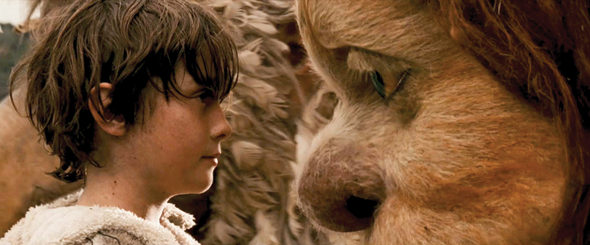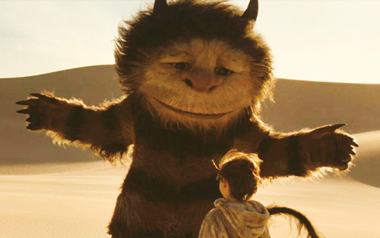 If your kids are still scared of monsters under the bed, then they clearly haven't met the Wild Things, the ferocious but lovable creatures from Maurice Sendak's 1963 classic children's book Where the Wild Things Are.
If your kids are still scared of monsters under the bed, then they clearly haven't met the Wild Things, the ferocious but lovable creatures from Maurice Sendak's 1963 classic children's book Where the Wild Things Are.
This month, visionary director Spike Jonze (Adaptation) brings this unique tale to the big screen. Where the Wild Things Are follows the adventure of Max (Max Records), a mischievous young boy who is sent to his room without his supper after rebelling against his mother (Catherine Keener).
Max's imagination is free to roam, and it soon transports him to a thriving forest bordering a vast sea. Delighted, he sets sail for the land of the Wild Things, where he meets mysterious and strange creatures whose emotions are as unpredictable as their actions.
The Wild Things desperately long for a leader to guide them, just as Max longs for a kingdom to rule. When Max is crowned king, he promises to create a place where everyone will be happy. Max soon finds, though, that ruling his kingdom is not so easy and his relationships prove to be more complicated than he originally thought. The beasts brand him “the most Wild Thing of all.”
When Max begins to feel lonely, he longs for a place “where somebody loves him best of all.” He decides to leave the Wild Things behind and return home to the safety of his own room, where he finds his supper waiting for him, still hot. His mother, who never appears in the book, is not far away, ready for Max when he returns from his adventures.
 Sendak's book represents the archetypal story of a child asserting his independence from parents. It celebrates the power of the imagination and encourages children to face the Wild Things of this world with confidence. As Max finds out, sometimes you get more than you bargained for.
Sendak's book represents the archetypal story of a child asserting his independence from parents. It celebrates the power of the imagination and encourages children to face the Wild Things of this world with confidence. As Max finds out, sometimes you get more than you bargained for.
In some ways, the story mirrors Jesus' famous Parable of the Lost Son (see Luke 15:11-32), in which a head-strong young man demands his inheritance and sets out to find fame and fortune in a far-away country. Unfortunately, this son's rebelliousness has disastrous consequences. He wastes his money on “wild living” and ends up destitute—keeping company with the pigs. He's run into some Wild Things of his own—easier to tame in one's imagination than in real life.
When the son finally comes to his senses, he resolves to return home, beg forgiveness and offer to work as one of his father's servants. Anything is better than sleeping with the pigs. What he doesn't realize is that the father has been anxiously scanning the horizon for weeks, hoping for a glimpse of his lost son. When the boy returns, he runs to embrace him. Instead of reprisals or punishment, the father celebrates with a feast—slaughtering his best animal, putting a ring on his son's finger and welcoming him back without reservation.
Deep in our spirits, we all want to be “where someone loves us best of all.” Jesus' parable is perhaps his most powerful illustration of God's unconditional love for us. When we are tempted to stray, when we try to do things in our own strength, when we take God for granted, when we make a mess of our lives, there is still opportunity for redemption. When we come to our senses and ask God for forgiveness, He never disappoints. To drive His message home, Jesus promises, “There will be more rejoicing in Heaven over one sinner who repents than over 99 righteous persons who do not need to repent” (Luke 15:7).
God is waiting to embrace you and welcome you home. Even if you are a Wild Thing.









Comment
On Monday, November 9, 2009, Peter Restivo said:
Leave a Comment